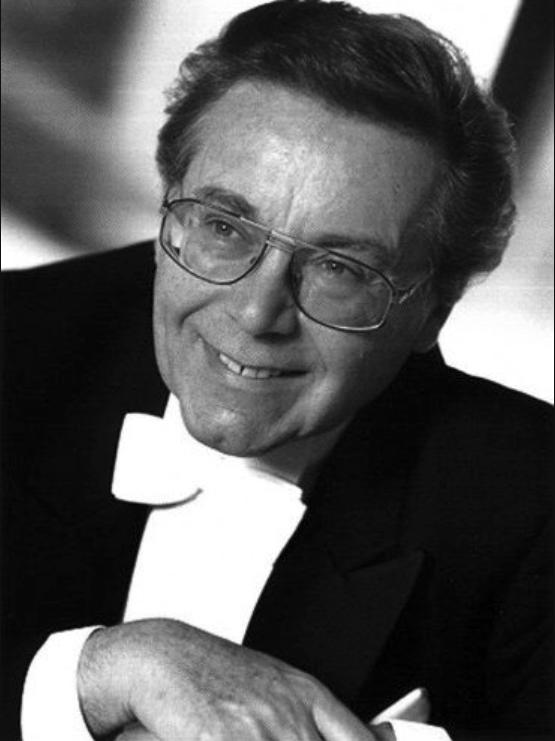The prize concert
The Swedish conductor Eric Ericson received the Léonie Sonning Music Prize of 200,000 Danish kroner at a concert on 12 June 1991 at the Tivoli Concert Hall in Copenhagen. The concert was broadcast live by the Danish Broadcasting Corporation’s P2 radio channel.
The prize was presented by the Royal Theatre’s Head of Opera, Poul Jørgensen, also the Léonie Sonning Music Foundation’s chairman. His speech included the following comments:
‘It is always a pleasure to present the Léonie Sonning Music Prize to an excellent international musician. As an old choirmaster, I can’t help but feel something special tonight as I give the prize to you, who down the years have been a great role model. The prize is given to you as an artist, but at the same time I think of it as a pat on the back for the art to which you have devoted your life. In Sweden, choral singing has been referred to as a “people’s movement,” with you standing at the top of the pyramid as founder, teacher and inspiration. After all, a choir conductor not only creates the music we listen to, he must also create the instruments it makes music with. Tonight we look forward to the special “Ericson sound” that your own chamber choir so magnificently demonstrates.’
citation
The Léonie Sonning Music Prize is hereby awarded to Eric Ericson in recognition of a lifelong work with choirs and for his efforts in the development of the choral literature. His work has also been groundbreaking beyond the borders of the Nordic countries and Europe and has set new artistic norms for choral singing as a means of musical expression.’
In his speech of thanks, Ericson made the following comments:
‘I feel honoured, and bow deeply to the long line of distinguished musicians who have previously received this award. This is of course an incredible personal joy for me, but I also feel like a representative of a kind of music that truly has a place in this country. Elsewhere I have seen that the professional choirs and their repertoire somehow end up in the shadow of concert life. But the situation here is what I want to call the sunny side. Perhaps it is precisely because of the place of choirs in our Nordic cultural arena that it is possible for a choir conductor to receive such a fine award, and I naturally think back to my early sources of inspiration in our common Nordic culture. We [Swedes and Danes] have often communicated across the Øresund, and it is a great pleasure for me to give a little again as a thank you for all that I have received from Denmark over the years.’
programme
Ligeti Lux Aeterna
Monteverdi Sestina, Lagrime d’amante al sepolcro dell’amata
Britten Hymn to St Cecilia
Brahms Six Choral Songs Op 62
Thomas Jennefelt & Sven David Sandström Den enda stunden
Frank Martin Five Songs of Ariel
Ingvar Lidholm …a riveder le stelle
Stenhammar Three Choral Images
Alfvén Och jungfrun hon går i ringen (encore)
Alfvén Uti vår haga (encore)
Participants
Eric Ericson Chamber Choir
Eric Ericson, conductor
You can listen to the entire speech here:
Eric Ericson and Denmark
Over the course of a long career, Eric Ericson gave countless concerts in Denmark. As far back as 1961, he conducted the Danish Radio Choir and introduced Danish listeners to new Nordic choral music in his performance. He also garnered great respect for his concerts of Bach’s choral works. In the 1970s, Ericson collaborated with many Danish artists including the composer Per Nørgård and the jazz violinist Sven Asmussen, while as a teacher of both choirs and choir conductors he has had several students in Denmark.
In the days after the prize concert, on 13-14 June, Ericson held a workshop with Sokkelund Sangkor at the Royal Danish Theatre. The workshop ended with a concert on 15 June 1991 at Ordrupgaard Museum. The concert was broadcast live on the Danish Broadcasting Corporation’s P2 radio channel.
The daily press
Monteverdi provided the perfect chamber music for the choir’s 36 singers. The phrasing was perfectly attuned, the sound subtle and poetic and the impression spontaneous. Love, pain and beauty went hand in hand. In Britten’s Hymn to St Cecilia Ericson gave a sense of the gently fluctuating rhythms and precise characteristics of each section.
(Thomas Viggo Pedersen, Kristeligt Dagblad, 15 June 1991)
I wish you could listen to it forever: that you could close your eyes and listen to this sound that soothes and does good – to this “Ericson Sound” as the opera director Poul Jørgensen called it when he presented the 1991 Sonning Music Prize on Wednesday night to the Swedish choral conductor Eric Ericson. Listening to Ericson’s choir with its founder on the podium is like enjoying a nice warm stove while listening to stories from all over the world. Gentleness descends upon the mind as Ericson sculpts the music. When he conducts contemporary music, it is as if the boundary between new and old is blurred. The changes in language suddenly seem to form part of a continuous development, rooted in the basic emotions of man. […]. The line between enthusiasm for Ericson’s choir and admiration for his own abilities is impossible to draw. This choir, which Ericson formed in 1945, has absolutely mastered vocal technique. Expressively, it is one of the most poetic ensembles in all of music. This is what choral perfection sounds like.
(Teresa Waskowska, Politiken, 14 June 1991)





